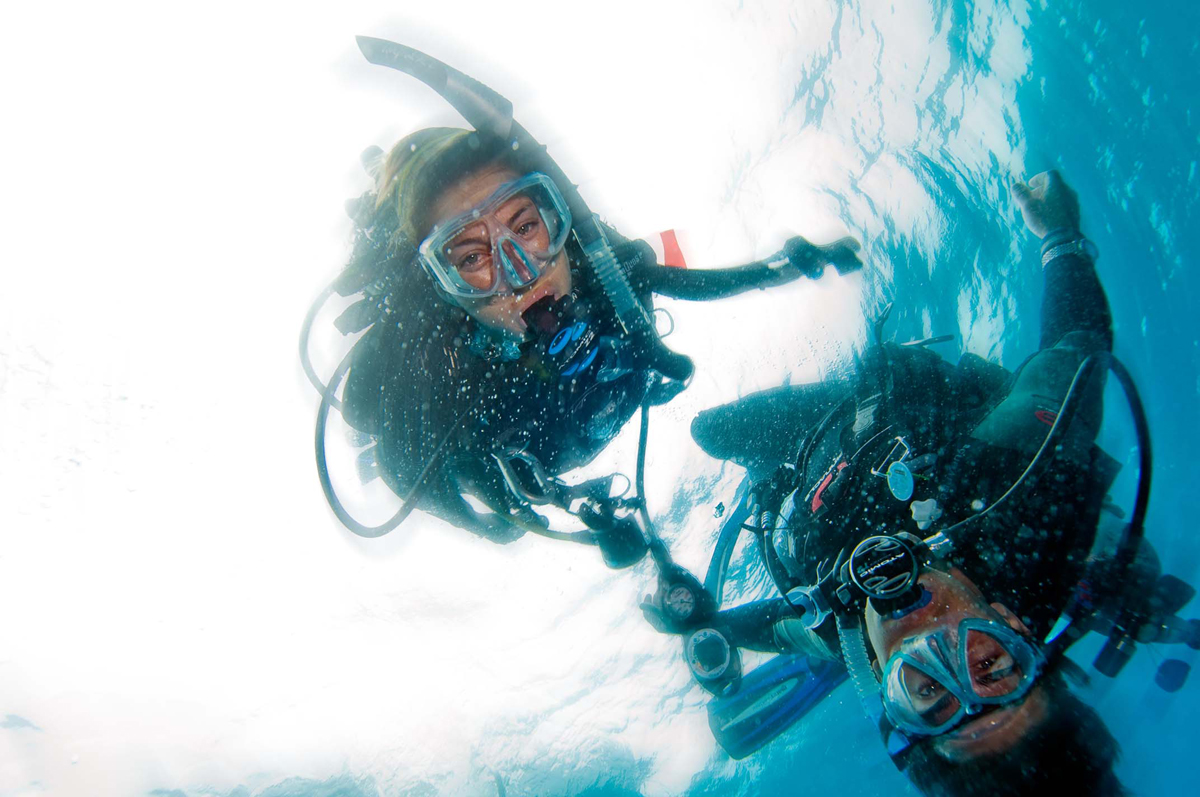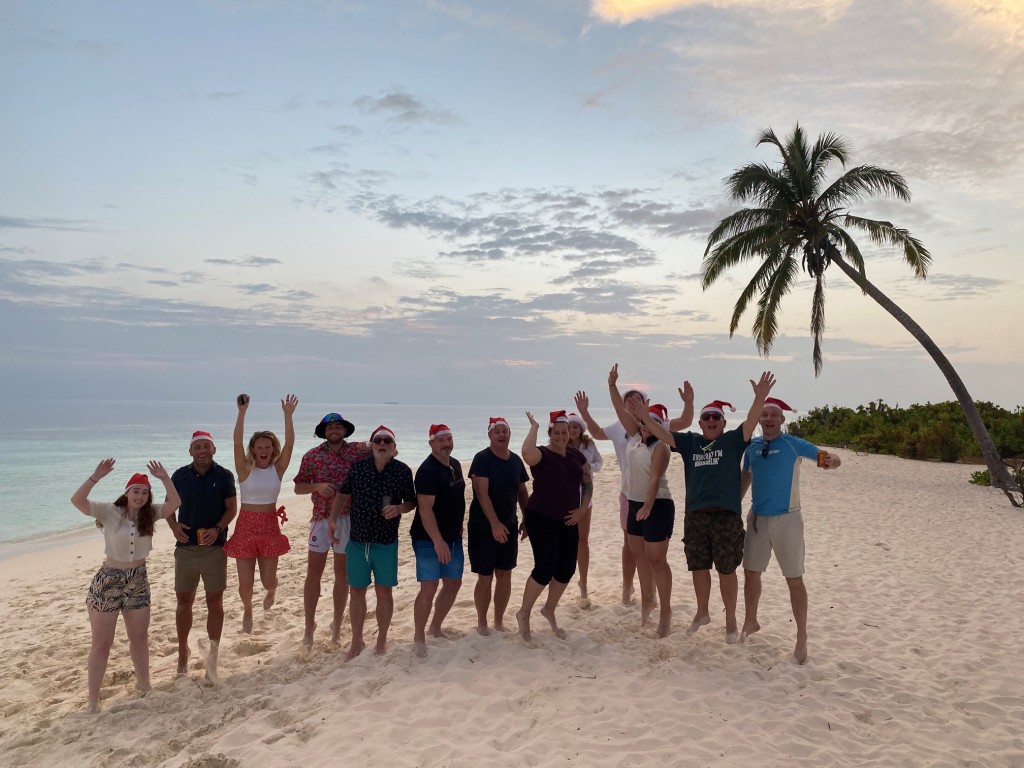3 Exciting Next Steps to Take After Completing Your Scuba Diving Course in London
Completing your PADI Open Water scuba diving course, whether in London, another UK location, or abroad, is a huge achievement. Congratulations! You’ve taken your first step into a whole new world beneath the surface, gaining skills, confidence, and certification as a scuba diver.
But this is just the beginning of your journey. Now that you’re qualified, an ocean of opportunities awaits. From joining fun dives and exploring UK dive sites to advancing your training or booking a diving holiday abroad, there are several ways to keep diving and develop your experience. Explore what might come next with our blog.
- What Does Open Water Certification Mean for You?
- 1. Gain Experience and Build a Community as a New Diver
- 2: The World’s Your Oyster: Book Your First Scuba Diving Experience or Holiday
- 3. Take the Next Step in Your Scuba Diving Training
- Is It Time to Invest in Your Own Equipment?
- Keep Your Dive Journey Going With Oyster Diving
What Does Open Water Certification Mean for You?

Earning your PADI Open Water Diver certification means you’ve proven that you can dive safely, confidently, and independently within certain limits. It’s a globally recognised qualification that opens the door to exciting new underwater adventures.
As a certified PADI Open Water Diver, you can now:
- Dive to a maximum depth of 18 metres (60 feet)
- Dive with a qualified buddy, without the need for direct supervision
- Rent scuba gear and tanks from dive centres around the world
- Join guided dives at resorts or on holidays
- Continue your training with advanced or speciality PADI courses
Beyond the technical qualifications, certification gives you confidence in the water, trust in your equipment, and the freedom to explore the underwater world safely, whether in the UK or overseas.
Here are three avenues to consider next after completing your Open Water scuba diving course.
1. Gain Experience and Build a Community as a New Diver
Becoming a certified PADI Open Water Diver is just the beginning. The best way to grow your skills, build confidence, and truly enjoy the underwater world is to keep diving.
The more you dive, the more comfortable you’ll feel with your equipment, buoyancy control, and dive planning. You’ll start focusing less on the basics and more on the incredible marine life around you, from colourful reefs to fascinating underwater dwellers.

One of the best ways to stay active as a diver is to join regular club dives or guided group trips. These offer a safe, social environment to gain experience with other divers at a similar level. And they’re a lot of fun too!
At Oyster Diving, we offer a welcoming community of divers, from beginners to pros, who love exploring new sites together. Whether you’re diving locally or heading abroad, our team is here to guide and support you every step of the way.
2: The World’s Your Oyster: Book Your First Scuba Diving Experience or Holiday
Now that you’re a certified scuba diver, the world and its oceans are essentially your playgrounds, there for you to enjoy responsibly. There are plenty of brilliant dive sites and locations to explore, so read on to find out our recommendations.
Scuba Diving in the UK
After completing your PADI Open Water diving course, you don’t need to wait for your next holiday to keep diving. There are plenty of exceptional dive sites to explore right here in the UK:
- Dive freshwater lakes and quarries like our very own Mercers Lake, or others like Stoney Cove or Vobster Quay. Here, you’ll find controlled conditions for building confidence and fascinating sites to explore.
- Coastal sites in Cornwall, Dorset, Wales, and Scotland all give you access to wrecks, reefs and marine wildlife – including seals and octopuses!

Scuba Diving Abroad
Looking to go further afield? As a certified diver, you can now book diving holidays to some of the world’s top scuba destinations, including some of our favourites like:
- The Red Sea, where you’ll find enticing warm waters and vibrant coral reefs.
- The Maldives and Indonesia, where you’ll find stunning biodiversity.
- Europe’s best dive sites, from Malta to Tenerife, which are closer to home but just as fascinating.
Book a Scuba Diving Adventure with Oyster Diving
With our very own in-house travel team, you can book onto expertly organised group holidays and liveaboard trips, all organised by experienced divers who know what makes a great trip.
3. Take the Next Step in Your Scuba Diving Training
Once you’ve completed your PADI Open Water course, continuing your scuba education is a natural and exciting next step. You’ll gain more confidence, expand your skills, and be able to access even more dive sites and types around the world.
Here are just a few of the courses you could explore next.
PADI Advanced Open Water Diver

The most popular next course is the PADI Advanced Open Water Diver. This course includes five adventure dives, such as deep diving and underwater navigation, and qualifies you to dive to 30 metres, opening up even more of the underwater world.
PADI Speciality & Further Education Courses
As well as continuing your dive education with advanced training, after PADI Open Water, you can also choose from a range of PADI Speciality and Further Education Courses tailored to a huge range of specific interests and goals. These include:
Speciality Courses
- Master Scuba Diver: The highest non-professional rating in recreational diving, this elite certification proves your experience, dedication, and completion of five PADI specialities.
- PADI Deep Diver Course: Learn to plan and conduct dives down to 40 metres, ideal for exploring deeper reefs and shipwrecks with confidence.
- PADI Sidemount: Improve streamlining and flexibility by learning how to dive with tanks mounted along your sides, ideal for caves, wrecks, or long dives.
- PADI Instructor Course: Take your passion to the next level and become a professional scuba instructor, teaching and certifying new divers around the world.
- Technical Diving Courses: Go beyond recreational limits with training in decompression procedures, gas mixes, and advanced dive planning for extended range and exploration.
Further Education Courses
- First Aid (EFR): The Emergency First Response course teaches crucial CPR and first aid skills, ideal for divers and non-divers alike, and a prerequisite for Rescue Diver certification.
- Rescue Diver: Build on your confidence and capability by learning how to prevent and manage dive emergencies, for yourself and others.
Is It Time to Invest in Your Own Equipment?
After completing your scuba diving course, you might start thinking about buying your own gear – and for good reason. Owning your own equipment not only improves comfort and fit but also helps build confidence and familiarity with the kit you’ll use on future dives.
You don’t need to buy everything at once. Most divers begin with personal items such as a wetsuit and then progress to more technical items like a dive computer, BCD, or regulator as their skills develop.
We’ve penned a whole helpful blog about when you should buy your own dive kit. Not sure where to start? We’re happy to offer expert advice and help you choose the right equipment, or you can browse our online store for trusted, high-quality diving gear.

Keep Your Dive Journey Going With Oyster Diving
You’ve completed your course, now it’s time to put those skills to use. Whether you’re ready for your next certification, keen to join a club dive, or curious about upcoming trips, we’ve got you covered.
Explore our dive club, global dive holidays, equipment shop, and advanced courses to keep your underwater adventure going.
